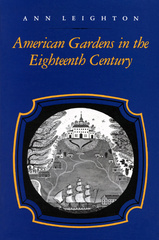Cultivating Environmental Justice
A Literary History of U.S. Garden Writing
University of Massachusetts Press
While Michael Pollan and others have popularized ideas about how growing one's own food can help lead to environmental sustainability, environmental justice activists have pushed for more access to gardens and fresh food in impoverished communities. Now, Robert S. Emmett argues that mid-twentieth-century American garden writing included many ideas that became formative for these contemporary environmental writers and activists.
Drawing on ecocriticism, environmental history, landscape architecture, and recent work in environmental justice and food studies, Emmett explores how the language of environmental justice emerged in descriptions of gardening across a variety of literary forms. He reveals early egalitarian associations found in garden writing, despite a popular focus on elite sites such as suburban lawns and formal southern gardens. Cultivating Environmental Justice emphasizes the intergenerational work of gardeners and garden writers who, from the 1930s on, asserted increasingly radical socioeconomic and ecological claims to justice. Emmett considers a wide range of texts by authors including Bernard M'Mahon, Scott and Helen Nearing, Katharine S. White, Elizabeth Lawrence, Alice Walker, and Novella Carpenter.
Drawing on ecocriticism, environmental history, landscape architecture, and recent work in environmental justice and food studies, Emmett explores how the language of environmental justice emerged in descriptions of gardening across a variety of literary forms. He reveals early egalitarian associations found in garden writing, despite a popular focus on elite sites such as suburban lawns and formal southern gardens. Cultivating Environmental Justice emphasizes the intergenerational work of gardeners and garden writers who, from the 1930s on, asserted increasingly radical socioeconomic and ecological claims to justice. Emmett considers a wide range of texts by authors including Bernard M'Mahon, Scott and Helen Nearing, Katharine S. White, Elizabeth Lawrence, Alice Walker, and Novella Carpenter.
Emmett's book is a centrally important contribution to ecocriticism, environmental justice discourse, and the burgeoning field of food studies and sustainability, because it is the first attempt to bring together the many historical and political backgrounds of the relatively recent emergence of the urban gardening movement in connection with environmental justice.'—Louise Westling, author of The Logos of the Living World: Merleau-Ponty, Animals, and Language
'Emmett's ecocritical attention to language allows him to foreground how the discourse of cultivation applies to aesthetic and literary tastes as well as practical questions of ethics and ecological restoration. . . . His chapter on the post-industrial US and the ghetto pastoral trope in community garden writing would be an excellent reading for courses about environmental justice.'—ISLE
Robert S. Emmett is director of academic programs at the Rachel Carson Center, Ludwig Maximilian University, Munich.











